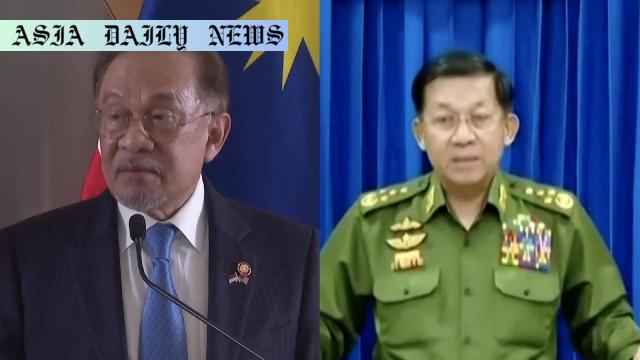Myanmar: Malaysia PM holds rare talks with military leader to address conflict ceasefire and earthquake relief operations.
Key Point 1: Malaysia’s PM Anwar Ibrahim meets Myanmar’s military leader for rare talks in Bangkok.
Key Point 2: Discussions focus on ceasefire and humanitarian relief for earthquake-hit Myanmar.
Key Point 3: ASEAN remains firm against legitimizing Myanmar’s military coup.
Key Point 4: Pro-democracy groups criticize ASEAN talks with Min Aung Hlaing.

Rare ASEAN Talks: Understanding Malaysia’s Leadership Role
Malaysian Prime Minister Anwar Ibrahim recently engaged in a rare and significant meeting with Myanmar’s military leader, General Min Aung Hlaing. The talks, which took place in Thailand’s capital city of Bangkok, revolved around pressing issues in Myanmar, including the longstanding conflict between Myanmar’s military and pro-democracy forces, as well as urgent humanitarian relief following the devastating earthquake in central Myanmar on March 28. This meeting demonstrated Anwar’s proactive approach as the Association of Southeast Asian Nations (ASEAN) chair, emphasizing diplomacy and the economic, social, and humanitarian challenges faced within the region.
Challenges of Prolonged Conflict in Myanmar
Myanmar has been entrenched in turmoil since a military coup overthrew the democratically elected government four years ago. The country’s condition has steadily worsened as clashes between the military forces and pro-democracy entities persist, further exacerbating an already fragile social and economic fabric. Despite temporary unilateral ceasefires announced for recovery efforts after the earthquake, reports suggest that fighting has resumed in several regions. These ceasefires are fragile and often dissolve into renewed hostilities, reflecting the deep-rooted divisions and mistrust among opposing factions. Prime Minister Anwar’s efforts to address these issues signify a critical step in ASEAN’s attempts to resolve crises within its member states.
ASEAN’s Stance: Balancing Diplomacy Amidst Criticism
ASEAN’s handling of Myanmar’s crisis has been under scrutiny for several years. The bloc has refused to allow Myanmar’s military representatives to attend major meetings of ASEAN since the coup, reflecting its rejection of authoritarianism and illegitimate rule within the region. However, Anwar’s recent engagement with Min Aung Hlaing, as ASEAN’s chair, is seen as a rare exception. These discussions gave ASEAN an opportunity to voice concerns over Myanmar’s conflicts and its humanitarian predicament. However, pro-democracy groups have roundly criticized such dialogues, accusing ASEAN leadership of tacitly legitimizing the military regime. These factions argue that humanitarian efforts can be pursued independently without engaging with Myanmar’s military leadership, thereby consolidating global opposition to authoritarianism.
Humanitarian Assistance: Earthquake Relief as a Priority
The central Myanmar earthquake showcased the urgent need for coordinated disaster management and humanitarian aid in the country. The natural disaster, which has displaced thousands and caused significant infrastructure damage, highlights the vulnerable state of Myanmar amidst its ongoing political conflicts. Relief efforts in regions stricken by the earthquake have called for both international collaboration and logistical support, with ASEAN leaders proposing a framework for structured aid allocation. Yet, concerns remain regarding the equitable distribution of relief, fearing that resources might be manipulated to serve military interests. This makes discussions like those held by the Malaysian Prime Minister even more critical, aiming to ensure that humanitarian aid transcends political interference.
The Road Ahead for Myanmar and ASEAN
The rare talks between Anwar Ibrahim and Min Aung Hlaing signify a cautious yet bold step forward. By focusing on addressing both the immediate humanitarian crisis and the prolonged conflict in Myanmar, Anwar underscores the region’s commitment to reconciliation and nation-building. However, achieving lasting peace in Myanmar is a steep challenge. While ASEAN strives for amicable solutions, broader global cooperation, including active engagement from powers such as the United Nations, is indispensable. Only through sustained diplomatic pressure, comprehensive humanitarian support, and inclusive peace dialogues can Myanmar hope for stability and recovery in the long run.
Commentary
ASEAN’s Delicate Balancing Act
The Association of Southeast Asian Nations is undeniably facing one of its most challenging political dilemmas in recent memory with the ongoing crisis in Myanmar. As an organization built on principles of unity and cooperation, ASEAN is striving to navigate the tenuous balance between condemnation of Myanmar’s military regime and the need to engage in practical resolutions. Prime Minister Anwar Ibrahim’s recent meeting with General Min Aung Hlaing is a testament to the complexity of such engagements. While his intentions—for fostering peace and aiding humanitarian causes—are clearly commendable, the nuances and optics of these talks must be managed carefully.
The Importance of Humanitarian Aid
One cannot dismiss the significance of addressing Myanmar’s humanitarian crisis. The earthquake, which wrought extensive devastation, has compounded the nation’s suffering amidst its political turmoil. The urgency of formulating effective relief mechanisms cannot be overstated, especially when vulnerable populations are left without basic necessities. However, integrating humanitarian assistance with broader political discussions does pose risks, including potential misinterpretations of legitimizing the military regime. It requires active collaboration among ASEAN member states to ensure proper resource allocation, transparency, and accountability in relief initiatives.
A Need for Global Involvement
Myanmar’s situation, while deeply rooted in regional dynamics, also necessitates global attention. As ASEAN chair, Anwar Ibrahim’s efforts can be complemented and strengthened through international engagement involving the United Nations, European Union, and various humanitarian organizations. Collective efforts, alongside regional dialogues, offer the greatest chance for stabilizing Myanmar. Still, these efforts require critical alignment of values and a shared resolve to prioritize the welfare of the country’s marginalized populations.


